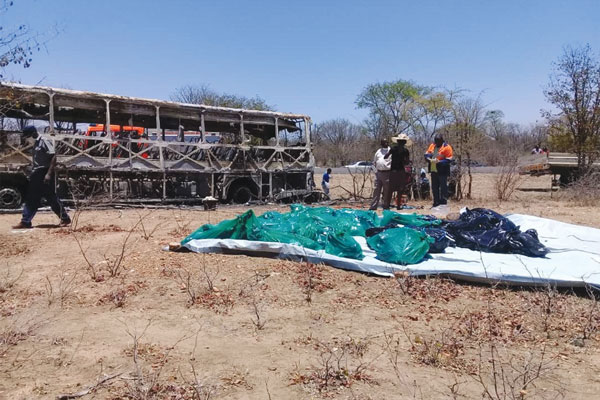
After the recent tragic bus accident that killed more than 40 passengers in Zimbabwe last week, people have been speculating as to what might have caused this tragedy when the bus was engulfed in a ball of fire causing multiple fatalities and left many with severe burns. Many believe that this was caused by a Liquefied Petroleum Gas (LPG) cylinder that was in the boot of the bus. Some people have even suggested that there could have been explosives on the bus. Below is my contribution to this discussion.
Opinion by Tendai B. Kadyamadare
1. An explosive will not explode easily. It requires what is called a detonator which introduces a shockwave into the explosive (this can be chemical, electrical or mechanical detonators). Some explosives can withstand a rifle shot without exploding. For argument sake let us assume this was an explosive-related incident.
In such a case, human bodies would have been ripped apart and that bus would have been shredded into metal pieces. Therefore, in short, explosives can confidently be ruled out in this case.
2. The gas leak theory seems more realistic. First let us get to understand what the gas in question really is. It is suspected there an LPG cylinder belonging to one of the passengers was on the bus. LPG is a term applied to those petroleum products (more correctly fractions) which are vapours at ambient (room) temperature and pressure but which can be liquefied by compressing them lightly or by cooling.
These gases are Propane and Butane or a mixture of both. When LPG is compressed to a liquid, its volume decreases so considerably that it will requiresignificantly less storage space. The product, therefore, is stored and transported in liquid form. Over the years LPG has become a popular source of energy for domestic purposes in Zimbabwe due to a number of reasons.
When the gas leaks from its primary containment it forms what is called a vapour-air mixture & if the mixture concentration is within the flammable range i.e. between what is known as Lower Explosive Limit (LEL) & Upper Explosive Limit (UEL), exposure of this mixture to any source of ignition will cause a violent explosion which usually manifests as a ball of fire and severe structural damages. This appears to have been the case in this Brooklyn bus incident.
As mentioned earlier, LPG inside the cylinder is stored in the liquid state because it is compressed for storage purposes. When it leaks it changes to gaseous state and expands rapidly (volume wise). If it is in a confined space, for example, inside a bus with windows closed, the vapour will accumulate with very little dispersion and this creates a very dangerous explosive atmosphere. When there is an ignition source an explosion + fire become certain and if there are people in the vicinity, fatalities are expected. In this particular accident sources of ignition could be naked electrical wires, sparks caused when u switch on lights, someone using a lighter or matches (unlikely), static electricity or hot surfaces like the exhaust pipes. It is also worth noting that gas fires can start at a point away from the leak source and literally the flame then starts to grow backwards to the source. So even if the gas cylinder was in the boot of the bus and there was a gas leak, the vapour would have easily filled the bus interior environment. According to some witnesses’ statements, one of the passengers complained of a gas smell and that is when the driver switched on the lights in a bid to verify the problem. My suspicion is that this (switching on the light) provided a spark that acted as the source of ignition and the rest, as we know is sad history.
- Chamisa under fire over US$120K donation
- Mavhunga puts DeMbare into Chibuku quarterfinals
- Pension funds bet on Cabora Bassa oilfields
- Councils defy govt fire tender directive
Keep Reading
Also note that the gas cylinders themselves will not easily explode. They have been designed to withstand high pressure (Safety in design features). It is the LPG vapour-air mixture that will explode when exposed to a source of ignition. This is important to note because some newspapers are reporting as if it is gas cylinder itself that exploded.
How could this incident have been avoided?
First and foremost, no one should be allowed carry LPG cylinders, whether full or thought to be empty, on public transport. The bus crews should always check and inspect what their clients are loading and prohibit any hazardous substances (toxic, flammable, corrosive, explosive) to be part of the luggage on the buses. That is a key preventive barrier in the hierarchy of controls required to have been in place to eliminate the hazards and risks that led to this incident. This is also a critical factor in this incident, hat is, if this gas cylinder had not been loaded on to the bus, this particular accident would certainly not have happened and lives would not have been lost this way. We can discuss safe transportation and storage of gas cylinders another day.
If you suspect a gas leak, for example in this case (i) stop the bus and switch off the engine; (ii) Do not switch on lights, torches or use cell phones, do not use lighters or matches; (iii) Evacuate everyone from the bus (iii) Ventilate the bus to dissipate the accumulated gas and also enriching the environment with Oxygen may help by getting the vapour-air mixture to go beyond the UEL which is a point at which the vapour-oxygen mixture is too rich to ignite (iii) Look for the source of the leak and try to stop the leak if you have the know-how otherwise stay clear of the bus and call Emergency Services
Tendai, a former employee of BP & SHELL Zimbabwe is a Health, Safety, Environmental & Quality Management professional with experience spanning over 20Yrs mainly in the Oil/Gas/Petrochemical industry in Africa & Middle East. He is currently involved in a mega Gas Processing Facility construction and commissioning project with a leading Oil & Gas organisation in Oman, Middle East.
He also a known ardent fan of Thomas Mapfumo and Chimurenga & Mbira Music and is a volunteer at Chimurenga Music Company.
Contact: [email protected] or [email protected] +968 9632 8764











